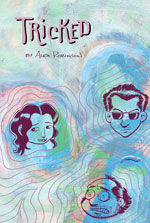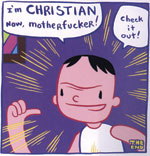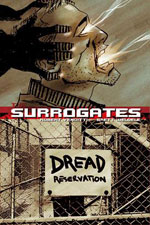
So it took a while before I could catch up with Tricked, but in a way Iím glad I waited to give it the time it deserves, for it is a terrific book. A bit like a comic book Short Cuts, Tricked is a Carver-esque series of character studies, where their lives all inexorably build narratives towards a flash point of meeting; a point at which those individual tales collide in a natural conclusion before scattering again, forever changed. And I like this idea that underpins Robinsonís larger story; that our lives are in some way elliptical spirals, orbiting out on paths of discovery, always drawn back to a single core of catharis that in turn throws us onto new pathways, new narratives. I like the idea too that the core is built on the essence of loss; of life and death, if you will. All of which I am aware sounds like hippy claptrap, but believe me, Tricked is no hippy claptrap. Rather, itís an artfully chaotic Indierock Gen X tale with eloquent drawing thatís creatively panelled. Itís smart but not too clever, cool but approachable, and eminently readable.
Similarly classy is D&Qís publication of Perfect Example, in which King Cat cartoonist John Porcellino records the episodic events of a summer between school and college. Often painfully honest, and with a spare, unnervingly keen observational eye, Porcellino manages to encapsulate the delicious horror of adolescence. With just a few lines and words he manages to cut through all the padding and prods artful thrusts of truth into the heart of the matter. Through road trips, drunken concerts and late-night make-out sessions, these comics display an inherent understanding of the conflict between the magnificent newness of experience and the disabling bullshit of teenage, and as such are perfect Pop mementoes. Thereís also a beautiful beatitude about much of Porcellinoís work here that reminds you that the age he is writing about is one of such sweet melancholia; he understands the important difference between that and the one-dimensional, stereotypical black depression that is too often trotted out as being the troubled teenagerís lot. Essential reading for anyone with a penchant for coming-of-age media.

Meanwhile over at Top Shelf thereís a new issue of James Kochalkaís ace Superf*ckers. If you took my previous advice and picked up the opening salvo then youíll no doubt be delighted to hear that Issue 273 has more of the same, and then some. Searching for sandwiches in Dimension Zero! Radical Randy in a coma! Everyone Loves Grotus! Hot new costumes! Vomit Rainbow! Jack Kraak goes Christian! More excessive cursing and general hanging out not doing very much! I mean, seriously, what more could you possibly want from a comic?!
And thereís more Kochalka in the second issue of the Conversations mini-comics, in which his American Elf takes on the great Jeffrey Brown of Be A Man, Clumsy etc in a frame by frame philosophical discourse on the whys and wherefores of drawing and publishing comics. It quickly degenerates into a slapstick conflict between Brownís more analytical, self-reflective, rationalizing approach and Kochalkaís devil-may-care Ďjust live life!í abandon. Shit, vomit and mops are involvedÖ

Elsewhere from Top Shelf, their five part Surrogates series
is shaping
up nicely. Weíre up to issue three of Robert Venditti and Brett Weldeleís Sci-Fi
Noir tale, and itís
turning into a fine commentary that ties together contemporary American (and
hence global) political, cultural and religious threads. Conflicts between fundamentalist
religions and those embracing changes affected upon society by new technologies
is arguably as old as the Sci-Fi genre itself of course, but Surrogates brings
a deftness of touch and a willingness to tread the fine lines between the two
intransigent extremes that is eminently engaging. In addition to Weldeleís edgy
storyboard style drawings there are some fine pin-ups in the latest two issues
by the likes of Matt Kindt (Pistolwhip, Two
Sisters), Jim Mahfood (40oz Comics) and my own favourite Steve Lieber (who
gave us the classic Whiteout). Well worth tracking down.
Worth tracking too but for altogether different reasons is Claire Harmerís gleefully
no-fi Claireís Idiots. Illustrating words taken from caravan games played out by her friends, this mini is full of surreal stick men, carrots, wine glasses and grinning potato chips. Insanely good, or just plain insane? Get a copy from www.afootbooks.com and decide for yourselves.
Now if youíve seen any of Dr Parsonís work before you might be tempted to call
him insane too, and with his newly self-published The
Reality of Cartooning he does nothing to make you doubt that opinion. Another
rabid collection of unfeasible rudeness is topped by the unspeakably crude and
hilarious Kate And Pete strip which itself culminates in another of Parsonís
trademark Hieronymus Bosch like tableaux. Itís
a squalid, sexually deviant nightmare, and all the better for it. Check www.thisisdrparsons.com for
details.
© 2006 Alistair Fitchett